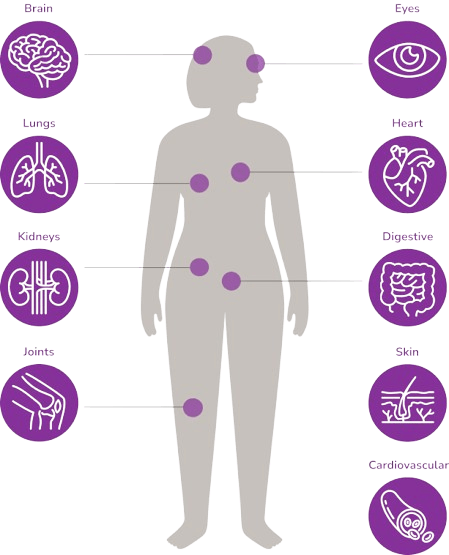For people ≥5 years with active SLE (lupus) or active lupus nephritis on other lupus medicines. Not for people with severe active central nervous system lupus. Serious side effects may include death, life-threatening brain infection (PML), and certain cancers. Tell your doctor ... [Continue Reading]
BENLYSTA is a prescription medicine used to treat people 5 years of age and older with active systemic lupus erythematosus (SLE or lupus) or active lupus nephritis (LN) (lupus-related kidney inflammation) who are receiving other lupus medicines. It is not known if BENLYSTA is safe/effective in people with severe active central nervous system lupus.
It is not known if BENLYSTA, given under the skin, is safe/effective in:
- children with SLE under 5 years of age or weighing less than 33 lbs
- children with LN under 18 years of age
It is not known if BENLYSTA, given in a vein (intravenously), is safe and effective in children less than 5 years of age.
BENLYSTA is a prescription medicine used to treat people 5 years of age and older with active systemic lupus erythematosus (SLE or lupus) or active lupus nephritis (LN) (lupus-related kidney inflammation) who are receiving other lupus medicines. It is not known if BENLYSTA is safe/effective in people with severe active central nervous system lupus.
It is not known if BENLYSTA, given under the skin, is safe/effective in:
- children with SLE under 5 years of age or weighing less than 33 lbs
- children with LN under 18 years of age
It is not known if BENLYSTA, given in a vein (intravenously), is safe and effective in children less than 5 years of age.
Do not use BENLYSTA if you are allergic to belimumab or any ingredients in BENLYSTA.
The most important information about BENLYSTA
Immunosuppressive agents, including BENLYSTA, can cause serious side effects. Some of these may cause death.
- Infections: fever, chills, pain, or burning with urination, urinating often, coughing up mucus, or warm, red, or painful skin or sores on your body. Infections could be serious, leading to hospitalization or death.
Do not use BENLYSTA if you are allergic to belimumab or any ingredients in BENLYSTA.
The most important information about BENLYSTA
Immunosuppressive agents, including BENLYSTA, can cause serious side effects. Some of these may cause death.
- Infections: fever, chills, pain or burning with urination, urinating often, coughing up mucus, or warm, red, or painful skin or sores on your body. Infections could be serious, leading to hospitalization or death.
- Allergic (hypersensitivity) reactions: itching, swelling of the face, lips, mouth, tongue, or throat, trouble breathing, anxiousness, low blood pressure, dizziness or fainting, headache, nausea, or skin rash. Serious allergic reactions can happen the day of, or in days after, receiving BENLYSTA and may cause death.
- Mental health problems and suicide: thoughts of suicide or dying, attempt to commit suicide, trouble sleeping (insomnia), new or worse anxiety or depression, acting on dangerous impulses, other unusual changes in your behavior or mood, or thoughts of hurting yourself or others.
Before receiving BENLYSTA, discuss with your healthcare provider if you:
- think you have an infection or have infections that keep coming back. Do not use BENLYSTA if you have an infection unless your healthcare provider tells you to.
- have or have had mental health problems such as depression or thoughts of suicide.
- have recently received or may need a vaccination. If you are receiving BENLYSTA, you should not receive live vaccines.
- are taking any medicines, including prescription, over-the-counter, vitamins, and herbal supplements.
- are allergic to other medicines.
- are receiving other biologic medicines.
- have or have had any type of cancer.
- have any other medical conditions.
- are pregnant or plan to become pregnant. It is unknown if BENLYSTA will harm your unborn baby. Talk to your healthcare provider about whether to prevent pregnancy while on BENLYSTA. If you choose to prevent pregnancy, you should use an effective method of birth control for at least 4 months after the final dose of BENLYSTA.
- become pregnant while receiving BENLYSTA, talk to your healthcare provider about enrolling in the BENLYSTA Pregnancy Registry. You can enroll in this registry by calling 1-877-311-8972 or go to https://mothertobaby.org/ongoing-study/benlysta-belimumab/.
- are breastfeeding or plan to breastfeed. It is unknown if BENLYSTA passes into your breast milk.
Possible side effects of BENLYSTA
- Progressive multifocal leukoencephalopathy (PML). PML is a serious and life-threatening brain infection. PML can result in death or severe disability. Tell your healthcare provider right away if you notice any new or worsening medical problems: memory loss, trouble thinking, dizziness or loss of balance, difficulty talking or walking, or loss of vision.
- Cancer. Medicines that affect the immune system, including BENLYSTA, may increase your risk of certain cancers.
The most common side effects of BENLYSTA are nausea, diarrhea, fever, stuffy or runny nose and sore throat, persistent cough, trouble sleeping, leg or arm pain, depression, headache, and pain, redness, itching, or swelling at the site of injection (when given subcutaneously). These are not all the possible side effects of BENLYSTA. Call your doctor for medical advice about side effects.
Please see Prescribing Information and Medication Guide for BENLYSTA.
